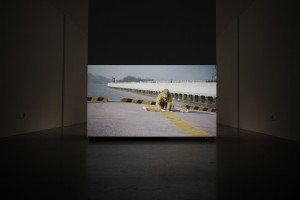In a three-hour period, Camella Kim imprinted the letters “#Untide shore” on the concrete shore of Jindo, South Korea. She put a powdered form of fabric with a frame on the glued surface, so the inscription felt like a cloth.
The inscription slowly faded over time, but her idea was for people to touch the imprint and reflect upon the sinking of the Sewol ferry again, said Kim, a UCLA graduate student.
Just a year ago, the site was buzzing with grieving families waiting for their children to return from a field trip.
On April 16, 2014, the Sewol ferry, carrying 476 passengers and crew, capsized off South Korea’s southwestern coast. As many as 304 people died or remained missing. Most of them were high school students and teachers from Danwon High School in Ansan, South Korea.
“’Un’ is a prefix for ‘not’ and ‘tide’ means ‘current of water,’ but it sounds similar to ‘tied’,” Kim said. “So ‘untide,’ or ‘untied,’ has the meaning of being unresolved or unfixed, and I believe there are definitely problems that need to be straightened out at this site, on this shore.”
A year later, the tragedy remains a controversy in South Korea. Many still criticize the government for not taking adequate precautionary measures and claim that its inadequate handling of rescue operations only worsened the situation.
Kim said that when she heard the news, she felt helpless.
“You could see the ferry sinking day and night, you could see the gymnasium where the victims’ families were staying, you saw how the president was apologizing on site, you sort of witness everything in a distance,” Kim said. “It just gave me a great anxiety watching it.”
In memory of the sinking, Kim went to the site of the incident at Jindo during winter break to perform her artwork.
The project was partly a response to the government’s delay in resolving the issue and an effort to sympathize with the families, a sentiment that many other students echoed, she said.

According to news sources, the ship was loaded up beyond its capacity, and the crew escaped the sinking ship while telling the passengers to stay put. Many said the media initially gave conflicting accounts of the incident, misinforming the public about the situation and the exact casualty numbers.
“I think this tragedy just further exposed the problems of Korean society,” said Byeonghee Lee, a fourth-year biochemistry student from South Korea. “The rapid economic surge of Korea left behind some flaws in the political system – and added with human selfishness – culminated into a catastrophe that should never have happened.”
Some students memorialized the event by making stickers.
Deokjun Choi, a fourth-year biochemistry student, and Inhye Kim, a fourth-year linguistics student, created stickers with the slogan “Pray for Sewol” a few months after the incident.
So far, the students from South Korea have distributed about 1,000 to 1,300 stickers around the United States and are still accepting orders for deliveries. The stickers have a picture of a ship with a yellow ribbon in the middle of the traditional blue and red “Taeguk.”
“We were neither disappointed nor thankful in our results, but we were just thankful that so many people were interested in our project,” Choi said.
Choi said the incident is important to him personally.
“I married the year the tragedy happened, so the anniversary of my marriage will coincide with the anniversary of the tragedy,” Choi said. “Like this, I hope others associate some important events in their lives with the incident to not forget about the tragedy.”
Other UCLA students sent letters to the high school that most of the students attended.
Felicia Vo, a fourth-year biology student, and Vivian Nguyen, a second-year biology student, started a project called “Dear Danwon” a few weeks after the incident happened. They collected letters from all around the world and sent them to Danwon High School.
Even though Vo and Nguyen didn’t get a response from the high school, they said they became more attached to the incident after gathering the letters.
“For me, I have a little sister who’s a junior, and (victims) could be my little siblings,” Vo said. “They were so young, and they had so much potential ahead of them.”
Choi hopes that this tragedy taught some lessons.
“I hope this incident serves as a reminder that such tragedies will not happen if everyone follows the rules and stays honest to their conscience,” Choi said.
